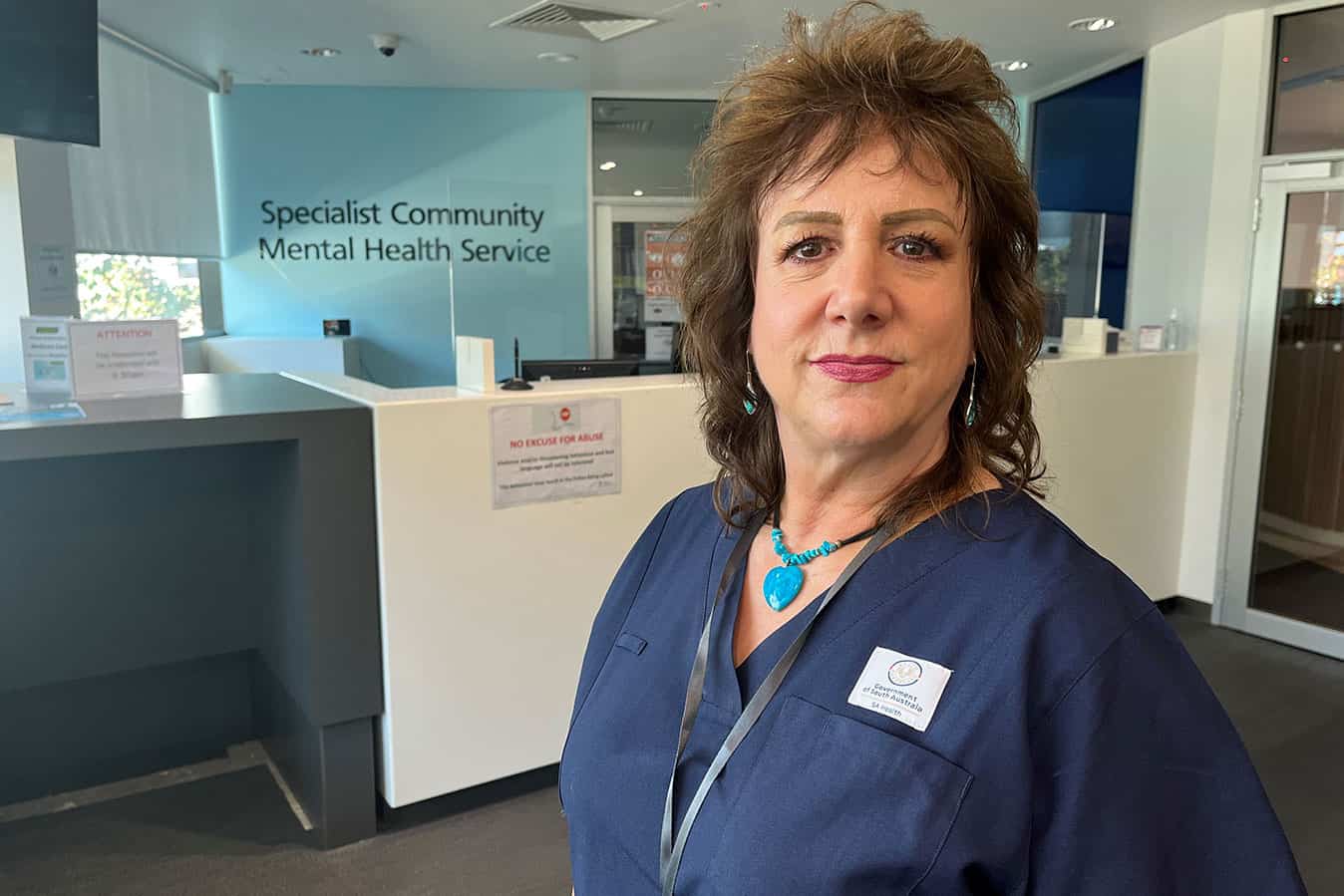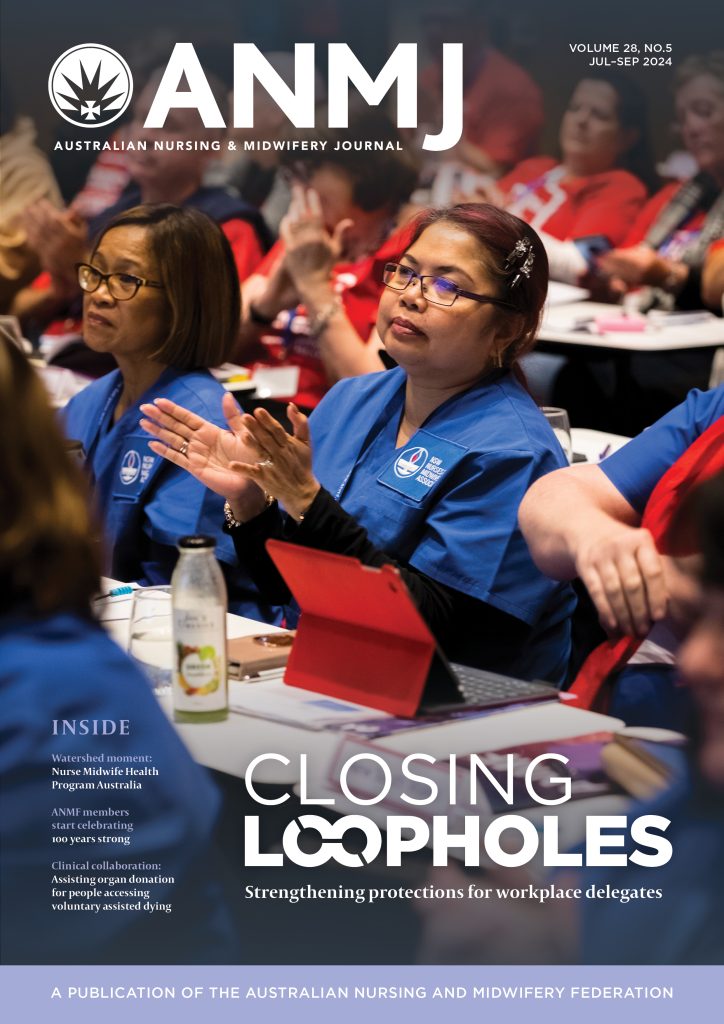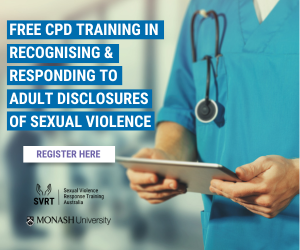“It’s the people and the stories and being allowed into their lives,” says acute community mental health nurse Jocelyn Douglass of the best part of her job.
“When people are experiencing mental health issues and we see them they are in an acutely vulnerable position. It’s a privilege and an honour to be able to be there and, potentially, to really help.”
Jocelyn has worked in mental health for 40 years.
After completing her general nursing training back in 1982, she was drawn to the field and the concept of “the psychological processes of human experience”.
“The idea of assisting people when they’re in strife and experiencing difficulties and needing support to work things out was an area that, back then, was reasonably undervalued,” Jocelyn recalls.
“It’s really grown in prominence over the years and today mental health is a bit of a buzz word that you hear all the time. Politically, it’s quite an important issue but back then, it wasn’t. I suppose I always tend to go for the underdog a bit and thought maybe we can make a difference in this area.”
Jocelyn has worked in both the public and private sectors in acute inpatient, general and psychiatric. She considers her current role, in acute community mental health, the most rewarding because it offers a greater scope of practice and the opportunity to work autonomously as part of a multidisciplinary team.
According to Jocelyn, working in the area requires years of expertise and knowledge.
The acute assessment and short-term intervention team encounters people experiencing a broad spectrum of mental health issues such as schizophrenia, bipolar disorder, and depression, as well as any acute crisis situation, including drug and alcohol problems.
While Jocelyn has the authority to take people to hospital, the aim is to treat people while they remain living in the community if possible.
“The spectrum of people we see would be almost like any other situation where someone is acutely distressed, whether it’s a relationship breakup, issues at work, financial problems or maybe they’ve been gambling and can’t pay their bills. Just a huge range of typical psychosocial issues that you would see with anybody in the community. If it reaches a level where they’re feeling so overwhelmed and out of options that they are no longer able to be safe, or to think through how they’re going to resolve that issue, then that becomes our issue.
“You have to clinically think through what is going to be best for that person and acknowledge their rights, because people have got rights even when they’re unwell, up to a certain point. It’s only when you feel that they are so at risk, or other people are so at risk, that you would then have to remove them from the community for a period of time, and that’s not a decision anyone takes lightly.”
The specialist community mental health service looks after people from the ages of 16 up until the elderly, with the model of care typically spanning six weeks. Often, people can be managed within the community if they agree to treatment and can be safely managed at home with appropriate support, which may include intensive follow-ups daily or several times per week, along with the support of family and friends. Sometimes, in some cases, it takes much longer.
To succeed as a mental health nurse in acute community mental health, Jocelyn says clinicians need to be practical, have a solid understanding of the Mental Health Act, and realise that they are working in an area not without some level of risk.
It’s a delicate balancing act, and nurses need to also acknowledge that people experiencing mental health issues are still basically strong and resilient. There are times when nurses need to intervene, but others when it’s important to step back and allow the person to make decisions for themselves so that they have a sense of purpose and can take ownership of their own self-recovery.
Above all, Jocelyn suggests nurses should put themselves in the shoes of people experiencing mental health issues and consider what type of care they deem appropriate.
“You need to be thinking not just about the service response but the person’s individual experience. Think about how it might be for yourself or a family member going through the same interaction and the type of support that you and your team are providing. If that is something that you would appreciate or you would value for you and your family then you know you’re on the right track. You always have to be thinking about that person’s experience and whether you’re value adding to their recovery journey, because ultimately it is their life, their mental health and recovery journey.”
Jocelyn admits the COVID-19 pandemic saw a surge in presentations and will likely trigger ongoing impacts, including for young people who undertook remote learning and were socially isolated.
“A lot of people who were working in jobs that are not secure, casual jobs, hospitality, all sorts of services where people were let go or where their hours were reduced, that has a direct impact if people are worrying about how they’re going to pay their bills, how they’re going to afford food, all sorts of things.”
After four decades in mental health, Jocelyn says the biggest change in the sector has been increased awareness.
“There’s been a big shift in the public health messaging regarding mental health. The word stigma used to be used a lot; people didn’t really want to admit that they were having any problems; they didn’t want to admit that their family members were having any problems. That’s all changed. It’s become quite acceptable now to say ‘I’m going through something, I’m experiencing a particular amount of stress or difficulties’. Seeking help is actually not considered a negative, which I think it was.”
Yet despite the growth in awareness, Jocelyn believes mental health nurses and the speciality have not received the same level of recognition. Many of her colleagues are retiring, or leaving the profession due to the increased strain caused by COVID-19, raising fears that significant expertise will be lost.
“My feeling is there’s not enough people coming in as I don’t think that the profile of mental health nurses has perhaps been raised enough to encourage people,” Jocelyn says.
“There is a massive mental health nursing shortage and there’s going to be this mass exodus where we will see people retiring and expertise and knowledge lost.”
Reflecting on her own career, Jocelyn is thankful that she chose mental health nursing as every day on the job is different and challenging.
Her advice to student nurses and early career nurses looking to enter the field is to gain as much experience as possible.
“To get good at it you need to experience it, you need to do it and you learn from really good experienced nurses that are out there,” Jocelyn says.
“Get the experience, do whatever you need to do to get that background and when jobs come up, take them up and come and experience it and that will set you up for the future.
“My generation, in the next few years, there will be quite an exodus and there will be lots of opportunities and certainly lots of opportunities for career progression and development.”









